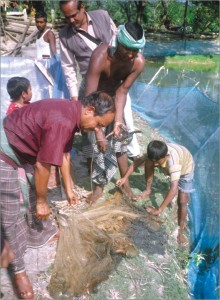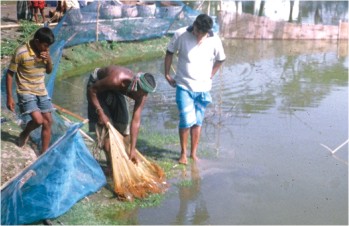|  From Bagerhat From Bagerhat
Grabbing Some Crab
Sharmin Chowdhury
Shubhash Chandra Mondol began an innovative kind of cultivation: crab. Ten years ago he began this business with the help of the NGO Shaplaphul. The organisation granted him the capital to initiate his business.
Mondol had not completed school and had no means of income other than labouring in others' land. He was among many who had to work hard to make ends meet and were still unable to provide a proper living for their families. Cultivating crab was of course a very new idea then, he was discouraged all throughout by people who surrounded him. Nevertheless, he went ahead with it.
Mondol briefs us on how he expanded his small operation and how he has helped others around him. Mondol has had to deal with a lack of funds for his new business along with harsh conditions. After getting the loan, he moved on to getting the land. Since he was initiating a rare kind of a business, he was regularly taunted by relatives and villagers. He explains how this small initiative turned out to be a profit for himself and the people around him. What pleases Mondol the most is that crab cultivation has led to improve his life and he believes it will surely play a major role in increasing the imports and exports in Bangladesh.
How did you set out to achieve your goal?
The Shaplaphul had granted me with capital of Tk. 2000 at the initial stages to start my business. People usually take such loans to adapt other modes of work such as farming or grazing animals.
However, I had to lease some land to start the farm since no one was willing to allow me to use their land for cultivation. My neighbouring farmers highly disapproved of my cultivation, for which I also had to build a high cage keeping the crabs from entering other farmer's lands.

One does not need any academic guidance to carry out this cultivation since it actually is very simple.
How much is your initiative helping others and how has it affected your family?
People in my area may have initially criticised me for my work but soon most started following in my footsteps. Following my guidance and assistance around a hundred people started cultivating crab. Following this, at least six hundred men and women were working in the farms.
The crab cultivation helped Bagerhat increase its bulk purchase from big cities including Dhaka along with things like shrimp. The farming was easily accepted by people since no health hazards were involved such as the spread of certain viruses. Unemployed people in my area with little capital, have started farming crabs in order to improve their conditions.
 Women have also participated in caring for the crabs, such as feeding, catching crabs and guarding. Because of this, my family is now in a better condition. My elder sons could not get proper schooling but they are working and helping me whenever they are free. I hope and pray I can provide my three younger children with an education and raise them well. Women have also participated in caring for the crabs, such as feeding, catching crabs and guarding. Because of this, my family is now in a better condition. My elder sons could not get proper schooling but they are working and helping me whenever they are free. I hope and pray I can provide my three younger children with an education and raise them well.
Tell me more about the nature of your business.
This idea of mine has been well accepted by the people in my area and the Shaplaphul organisation. Before beginning a new business, one requires a handy capital and in some cases it does not bear fruit. In the case of farming crabs, only Tk 5000 was needed for me to start. With such a low investment I could earn the profits within a year. It does become difficult to conduct a business with such minimal investment but in the case of crab cultivation the opposite in true.
I have never failed to repay the installments of the loans on time, the business has proven to be so successful that I didn't need worry about the money.
I have helped reduce unemployment in my area to an extent by introducing this new technique.
Unlike the covered area used for shrimp cultivation which does get ruined, the crab farm is less prone to such harm. This leads to more stability and causes less hassle to the owner.
The death rate of crabs is also very low unlike that of the shrimp, such factors have a huge impact on our business since otherwise it would become difficult for people like us to maintain the farm. The land required for farming crabs is scarce. Maintaining the accounts of the profits and loss isn't very hard and I manage the accounts myself which reduces the chances of any kind of miscalculations..
How many workers are there and what category do they comprise of in your farm?
Overall, I have six employees, twelve temporary workers and amongst them three very senior people who have nowhere to go to for shelter or food.
How would you sum up your income and profit for the last three years?
The business I run earns on an average an income of around Tk 8,30,000. The cultivation of crabs is good business, the sales are high and trucks from all over are sent for bulk purchase. At times, we are paid in advance because the sources of crabs are very few.
What kind of natural disasters one must look out for when farming crabs?
The only fear we have is that of flooding, which can wash away all the crabs and destroy the field. To avoid such things, we usually build cages of about 4-5 feet and then cover the cage with nets. We usually do pretty good at keeping the water out.
Copyright
(R) thedailystar.net 2008
|
